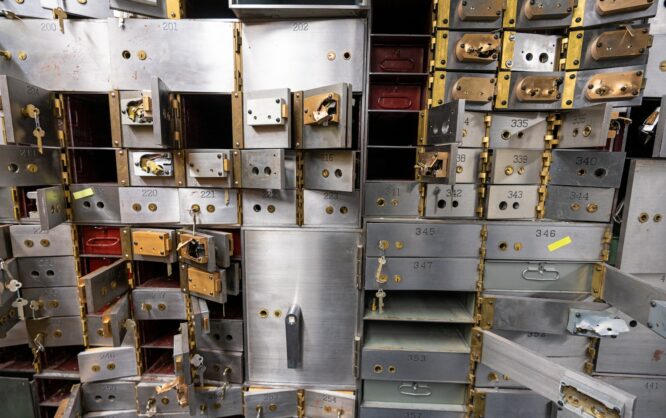How do you Ensure your Business Runs Smoothly in Turbulent Times?

Recession.
It's the word businesses dread because it means layoffs, a decline in sales and profit - and for many, bankruptcy.
However, the world has already weathered a great number of recessions, and businesses have been finding ways to thrive even in the direst conditions.
That means you can do it too, and this article provides you with actionable ways in which you can ensure your business runs smoothly in turbulent times.
1. Assess the impact of the crisis on different aspects of your business
The way your business operates, how it generates revenue, who your customers are, and what your products are like determine how you can attract and retain new investors and talent.
If you want an overview of how these things work, an activity map or a flowchart can tell you whether the way you're currently operating makes it possible for you to meet your business objectives.
However, when the recession hits and when the resources of your consumers get scarce, your business will likely show certain shortcomings when attempting to meet those objectives.
As it gets increasingly hard to get money out of people's pockets, you'll need to adapt and figure out how to address your customers' problems in a cheap way for them but still profitable for your business.
How? By figuring out how each aspect of your business is affected by turbulent times.
To get this sort of insight, you need to talk to your stakeholders.
Talk to your suppliers. Take a look at how your consumers are behaving – how their needs and the overall market are changing.
Ask yourself: Where do my products and services fit in now?
Anticipating the issues that may arise and analyzing how the successful business models of your competitors have tackled similar issues in the past is the key to marketing in a recession.
Then, borrow from their experience and remain positive. Recessions tend to last up to 12 months, so you just need to keep your head above water for a couple of months.
2. Consider your payroll
History has shown that recession proof businesses and employment loss are synonymous in people's minds.
Unstable times often lead to layoffs, which is something that both businesses and their employees fear.
Juggling layoffs, protecting your business from legal liability, fighting the fear of your remaining top employees, and trying to keep them motivated is no easy feat, but someone has to do it.
If you come to a point where you have to lay people off, you want to make sure that the decisions you're making will keep your business running smoothly until the tough times are behind you.
The way you can do that? By hiring and keeping the right people.
You need to figure out which employees are confident that you can pull it through and can back it up by getting the job done. Identify those who can handle extra tasks, work in a team, bring hope into the corporate environment, and focus on the bottom line.
Sounds like a lot to ask of very few people? That's because it is.
And that means that, if you want to keep top players on your side, you need to keep them motivated.
The best way to find out what motivates your employees is to talk to them, not just when hiring them, but also every now and then once they join the company. It might also be a good idea to interview those who have been laid off to understand what they were dissatisfied with.
In either case, you can't go wrong with compensating your employees properly for their work.
While it may be tempting to underpay your staff when the recession hits, it's always better to make cuts elsewhere and invest in what's essential - and that's your human resources.
(Even if that means taking a pay cut yourself.)
3. Delegate tasks, create functional teams, and develop a sense of belonging in the workplace
Now that you've got the right people on your side, you need to get them working on the right tasks.
Task delegation is essential if you want to save resources and have your employees perform efficiently in teams.

And that's the other thing – with turbulent times ahead, teams that work well are what will keep you afloat.
What we mean by that is that having a functioning team, as opposed to one where people aren't actively collaborating, is what can make or break a business during a recession.
Why?
Because if you've made layoffs and you're left with very few people where each of them is handling large chunks of workload - if just one of them leaves, you're left in a tough position where you can't quickly replace them and no one else can pick up where they've left off.
Having a functional team means providing training to all of them, all while ensuring that they're sharing skills and knowledge among themselves.
Just be wary of creating a sense that everyone is replaceable just because anyone in the office can do their job.
Let your employees know how valuable they are, promote positive relationships between colleagues, and work on creating a sense of belonging in the workplace.
That's how you boost the share of ideas, the morale, and that's how you meet your common objectives.
4. Have liquid assets to cover your business in emergencies
Think about the predictable, short-term expenses that your business might have. When turbulent times arrive, you want to cover those first.
To ensure that you've got the means to handle these expenses, you'll want to have enough cash on hand.
Get a loan early, before the rates skyrocket.
Look into short-term financing options, such as invoice factoring, to speed up the payments.
Secure a line of credit.
If you've got savings, tap into them. If you've got stock holdings, liquidate them.
Borrowing money can help your business survive the tough times, but be mindful of the losses you could face if you default on payments.
5. Cut costs where you can
Turbulent times are the perfect opportunity to take a look at your company's income statement and identify the recurring expenses that are putting a dent in your budget.
The most important recurring expenses you should focus on are the smaller ones, as they tend to be overlooked when times are good, but can quickly add up.
For example, consider the equipment and office supply costs.
Ask yourself questions like:
- Does your office really need a revamp now?
- Can the branded products that you use be replaced with generic ones?
- Are any of your supplies recyclable?
- Can you reduce the amount of paper that you use?
Monitor which of the supplies are used the most by your staff and which get wasted. Ask your employees for feedback and suggestions regarding cost control.
Another area in which you can make cuts is in the supplies used to make your products.
However, you want to be mindful of the impact these cuts may have on the quality of the finished product, as that is something you want to avoid.
One thing you could do is to keep the same supplies, but use fewer of them per piece of product. Then, you can sell that product at reduced size or quantity, at the same price. That's shrinkflation, for you!

6. Go remote
While we're on the topic of cutting recurring expenses, here's a larger cut that you could make and completely transform your business.
Go remote.
China's largest travel agency, Ctrip, has managed to reduce office costs by $1,250 annually per employee by introducing telework.
Remote work, in certain industries, is even seen as a determining factor in employees choosing whether they want to work for a certain company. This shift is most notable in the IT sector.
Still, going fully digital requires quite a few changes in your business model.
For starters, if you're a retailer relying on customers who physically visit your stores, you'll want to set up an e-commerce store with an online order system.
Then, you'll want to communicate this change, along with your brand's values, to your consumer base. This means building a presence online, including on social media platforms.
You'll also want to consider the infrastructure of your remote work, to ensure that:
- Your staff has the necessary equipment, tools, and training to work from home
- Your key data is secure
- Your team members can communicate effectively with one another
- Your company culture remains positive
7. Reconsider your business offer
Historically, consumers in a recession tend to spend most of their money on essentials while seeking out bargains and cheaper alternatives to branded products.
If you aren't selling things that people can't live without, expect to be hit harder by the recession.
Sure, you could give discounts, but this will only get you so far if people don't have money to spend on luxuries.
So, what can you do?
Well, you can adapt.
And by adapt, we mean to change your business offer.
Look at that inventory of yours. Look at the supplies used to make your product.
What else can you use them for? How can you repurpose them to make something useful for your customers?
Remember: tough times don't last forever. If you find a way to help your community survive the tough times, they'll remember it and reward you with loyalty once the crisis ends.
Conclusion
When things get hard, it's important to remain positive.
Remember that there isn't just one, but many solutions that can keep your business running. However, if you lose your cool, you'll blink and miss them.
Featured Image by Jason Pofahl on Unsplash
